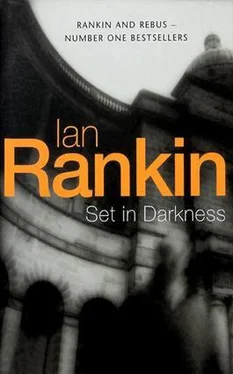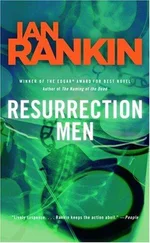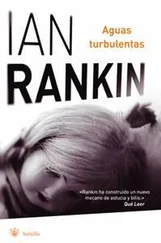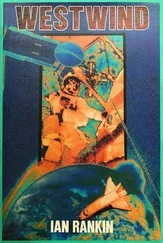Rebus shook his head.
‘Best pub there was. I drank there often. And now... well, down it came. They built a DIY store where it stood. Just up the road from your cop shop.’
Rebus nodded. ‘I know the spot.’
‘All changing,’ Cafferty said. ‘Maybe you’d be better out of the game, after all.’ He lifted the glass to his lips. ‘Just a thought, mind.’ He finished the drink.
Rebus took a deep breath. ‘Ah-choo!’ Making show of sneezing across Cafferty’s chest, then studying his handiwork. His eyes met Cafferty’s. If looks were weapons, they’d have cleared the pub. ‘You lied to me,’ Rebus said quietly, walking away from the bar as the guitarist finally got his instrument in tune.
‘You’ll go to your grave a gobshite!’ Cafferty yelled, brushing flecks of saliva from his polo neck. His voice stilled the music for a moment. ‘Hear me, Strawman? I’ll be dancing on your bastard coffin!’
Rebus let the door close behind him, inhaled the street’s smoke-free air. Noises off: more kids heading home. He rested his head against a wall, a cold compress for his burning thoughts.
I’ll be dancing on your coffin .
Strange words to come from a dying man. Rebus walked: down Nicolson Street to the Bridges, and from there down into the Cowgate. He stopped near the mortuary, smoked a cigarette. He still had his bag with him: rolls and sausage. He felt like he’d never be hungry again. His stomach was too full of bile. He sat on a wall.
I’ll be dancing on your coffin .
A jig it would be, unrestrained and awkward, but a jig all the same.
Back up Infirmary Street. Back along to the Royal Oak. He kept back from the windows this time. No music: just a man’s voice.
How slow ye move, ye heavy hours,
The joyless day how dreary.
It wasna sae ye glinted by,
When I was wi’ my dearie ...
Cafferty again; another of Burns’ songs. His voice full of pain and pleasure, pulsing with life. And Rab, seated by the piano, eyes almost closed, breathing laboured. Two men fresh minted from the Bar-L. One dying in full voice; the other wasted on freedom.
It was wrong. It was very, very wrong.
Rebus felt it in his own doomed heart.
Part Three
Beyond This Mist
Yet frost under sunlight can sparkle like hope
even while muscles cramp, and the freezing damp
can whisper ‘let the bottle rest for once.
There are warm mysteries beyond this mist.’
Angus Calder, ‘Love Poem’
Jerry walked into the dole office frozen and soaked. There hadn’t been any shaving foam left in the can, so he’d had to use ordinary soap, and then his last razor was in the bath, where Jayne had blunted it shaving her legs. Cue the morning’s first argument. He’d nicked himself a couple of times; one of the spots wouldn’t stop bleeding. And now his face was stinging from the sudden sleet, and of course as soon as he got in through the dole office door, didn’t the cloud break and the sun come out?
It was a cruel city, this.
And then it turned out, after he’d waited half an hour, that his appointment wasn’t at the dole office at all, but with the DSS, which was another half-hour’s walk. He almost gave up and headed home, but something stopped him. Home: was that what it was? How come these days it felt like a prison, a place where his gaoler wife could nag and grind him down?
So he made for the DSS office, and they told him he was an hour late, and he started explaining but nobody was listening.
‘Take a seat. I’ll see what we can do.’
So he sat down with the wheezing masses, next to an old guy with a blood-curdling cough who spat on the floor when he’d finished. Jerry moved seats. The sun had dried out his jacket, but his shirt beneath was still damp, and he was shivering. Maybe he was coming down with something. Three-quarters of an hour he sat there. Other people came and went. Twice he went up to the desk, where the same woman said they were trying to find him ‘a slot’. Her mouth looked like a slot, thin and disapproving. He sat back down.
Where else was there for him to go? He thought of working in an office like Nic’s, nice and warm and with coffee on tap, watching the short skirts swish past his desk, one of them leaning over the photocopier. Christ, wouldn’t that be heaven? Nic was probably heading off to lunch now, out to some swank place with crisp white tablecloths. Business lunches and business drinks and deals done with a handshake. Anybody could do a job like that. But then not everybody married the boss’s cousin.
Nic had phoned him last night, started given him a roasting for bottling out, running off into the night like that, but making a joke of it in the end. Jerry had caught an inkling of something: Nic was afraid of him. And then it had struck him why: Jerry could tell the cops, spill the beans. Nic had to keep him sweet, that was why he turned the episode into a joke, ended with the words, ‘I forgive you. After all, we go back a long way, eh? The two of us against the world.’
Except that right now, it felt like Jerry was all on his own against the world, stuck here in this smelly hole, no one to help him. He was thinking back: two of us against the world , when had that ever been true? When had they ever been equals, partners? What in God’s name did they see in one another? He thought maybe he had an answer for that now, too. It was a way of cheating time, because when they were together they were the same kids they’d always been. And so the things they did... they really were a game, albeit a deadly serious one.
Someone left their paper behind when they went in for their interview. Christ, and the guy had turned up twenty minutes after Jerry, yet here the bastard was, waltzing into a cubicle ahead of him! Jerry slid over, picked up the tabloid, but didn’t open it. There was that bile in his gut again, that fear of what stories he might find inside: rapes, assaults, not knowing if Nic was responsible. Who knew what Nic was doing behind his back, all the nights they didn’t meet? And all the other stories, too: newly-weds, happy marriages, stormy relationships, sex problems, babies being born to famous mums. Everything bounced back on his own life, and all it did was make him feel worse.
Jayne: clock’s ticking .
Nic: time you grew up .
The minute hand on the clock above the desk moved another notch. Clock-watching: wasn’t that something you did in offices, when you weren’t watching the skirts swish past? Who was to say Nic had it so good? He’d been working for Barry Hutton’s company these past eight years, hadn’t seen much in the way of promotion.
‘Sometimes,’ he’d complained to Jerry, ‘that family thing can backfire on you. Barry daren’t promote me or everyone’ll just say it’s for who I am, not what I do. Do you see?’
And then, when Cat had left him: ‘That bastard Hutton’s just looking to get rid of me. Now Cat’s done a runner, he sees me as an embarrassment. See what she’s done to me, Jerry? The cow’s as good as lost me my job. Her and her bastard cousin!’
Fuming, seething, raging.
And this from a guy who lived in a £200,000 house and had a job and car! Who was it really needed to grow up? Jerry wondered about this more and more.
‘He’ll ditch me, Jer, soon as he gets half a chance.’
‘Jayne says she’s going to ditch me, too.’
But Nic hadn’t wanted to hear about Jayne. His only comment: ‘They’re all as bad as each other, swear to God, pal.’
All as bad as each other .
He stomped back to the desk. What was he? A dummy or what? Wasn’t he married, settled? Didn’t he deserve a bit of respect?
Читать дальше












